- Home
- Kim Newman
The Man From the Diogenes Club Page 45
The Man From the Diogenes Club Read online
Page 45
‘Memories being what they were, folks who didn’t have a financial interest in the venture were reluctant to board the “In-for-Death Express”. Only grimly smiling directors and their perspiring wives and children were aboard for the accident-free re-inaugural run. You can imagine the sighs of relief when Inverdeith Bridge was safely behind them. Controlling interest in the LSIR was held by Douglas Gilclyde of Kilpartinger, who horsewhipped a secretary he thought misreferred to him as “Lord Killpassengers”. It was a point of pride for His Lordship, a parvenu ennobled by Lloyd George, to make the Scotch Streak a roaring success again. He tarted 3473 up with a fresh coat of purple and replaced the gold trim with his own newly minted tartan – which the unkind said made the engine look like a novelty box of oatcakes.
‘Kilpartinger lured back the hunting set by trading speed records for social cachet. From 1934, the Scotch Streak became famously, indeed appallingly, luxurious. Padding on padding, Carrara marble sinks, minions in Gilclyde kilts servicing every whim. The train gained a reputation as a social event on rails. 3473 pulled a ballroom carriage, a bar to rival the Criterion and sleeping cars with compartments like rooms at the Savoy. In addition to tweedy fowl-blasters, the Streak gained a following among the “fast” crowd. Debutantes on the prowl booked upand-down services for months on end, in the hope of snaring a suitable fiancé. One or two even got married before they were raped. When his disgusted pater kicked him out of the family pile, Viscount St John “Buzzy” Maltrincham took a permanent lease on a compartment and made the Scotch Streak his address – until a pregnant Windmill Girl cut his throat somewhere between the Trossachs and Clianlarich.
‘He wasn’t the only casualty. The Streak’s Incident Book ran to several spine-tingling volumes. People threw themselves under the train, got up on top and were swept off in tunnels, were decapitated when they disregarded “do not lean out of the window” notices, opened doors and flung themselves across the landscape. Naturally, a number of fatalities occurred around Inverdeith. There was a craze for booking the up service on the Streak, naturally not bothering with the return. The procedure was to put a particular record on the wind-up Victrola as the train crossed the bridge, then take a graceful suicide leap as Bing Crosby crooned “a golden goodbye”. Mistime it, and you smashed into a strut and rained down in pieces.
‘Kilpartinger played up the Streak’s glamour by engaging the likes of Noël Coward, Elsie and Doris Waters, Jessie Matthews and Gracie Fields to entertain through the night. A discreet doctor prescribed pick-me-ups to keep the audience, and not a few performers, awake and sparkling. Houdini’s less-famous brother escaped from a locked trunk in the mail van and popped out of the coal tender. The Palladium-on-Rails business soured when a popular ventriloquist was institutionalised after an argument with his dummy. His act started off with the usual banter, then the dummy began making passes at women in the carriage. The vent was besieged. His dummy jeered him as he was beaten up by angry escorts. He snatched a hatchet and chopped at the dummy’s mocking head, taking off three of his own fingers.
‘Of course, there were whispers. Among railwaymen, the Streak picked up a new nickname, “the Ghost Train”. In 1938, I drafted a pamphlet for inclusion in my series, Haunted High-Ways. I got a look at the Incident Book. I conducted tactful interviews with passengers. They expressed a vague, unformed sense of wrongness. They saw things, felt things. Anecdotes piled up. The dirty dummy and the throat-cut bounder were the least of it. Several regulars dreaded trips on the Streak, but were unable to resist making them – as if afraid of what 3473 would do if they abandoned it. Real addicts use the serial number, never the name. Lord Kilpartinger issued writs and threats, then invited me to tea at Fortnum & Mason. With some justification, he pointed out that any train which carried as many passengers over as many years must collect horror stories and that I might as well investigate tragedies associated with the five-twelve from Paddington to Swindon. Besides, he had just bought a controlling interest in my publisher and wondered if I wouldn’t rather write books on flower-arrangement or how to host a dinner party.
‘As I left, in something approaching high dudgeon, His Lordship tried to reassure me about the train. After all, he said, he’d travelled more miles on the Streak than anyone else with no obvious ill-effects. A month later, for some anniversary run or other, he boarded at Euston, posing cheerfully in his tartan cummerbund for the newspapers, clouds of steam billowing all around. After retiring to his compartment, he disappeared and did not pop out of the coal tender. He didn’t get off at Edinburgh or Portnacreirann. The general consensus was that he had contrived a fabulous exit to avoid the bankruptcy proceedings which, it turned out, were about to bring down the LSIR. Maybe Kilpartinger became another anonymous navvy on his beloved line, swinging a hammer next to the disgraced McRidley. Or perhaps he dissolved into a Scotch mist and seeped into the upholstery. If you run across him, give him my best.
‘With the LSIR in ruins, it seemed likely the Streak had made its last run. It was saved by the War. Luxury took a backseat to pulling-together, but the Streak was classified an essential service, supporting the Royal Navy Special Contingencies School at Portnacreirann. The Diogenes Club was busy on other fronts, but spared a young parapsychologist with a plum-bob and an anemometer to make a routine inspection. He ruled the train, the tracks and Inverdeith Bridge were perhaps slightly haunted. Had the Ruling Cabal listened to me rather than that bright lad, we would perhaps not be in this current pickle, but there’s no use squalling about it now.
‘Soon, there was another strange story about: take the Streak to your Special Contingencies course, and you’d win a medal. I went over the records last week – an enormously tedious job – and can confirm this was, in fact, true. “Special Contingencies”, as you might guess, is a euphemism for “Dirty Fighting”, which goes a long way towards explaining things. Nevertheless, a high proportion of the Streak’s sailors proved aggressive, valiant and effective in battle. A high proportion of that high proportion got their gongs posthumously. The more often a man rode the Scotch Streak, the more extreme his conduct. We don’t publicise the British servicemen tried for war crimes, but out of fewer than a dozen bad apples in the Second World War, five were Streak regulars. Americans rode the Ghost Train too. We don’t have official access to their records, but they have Alexanders and Caligulas too.
‘After the War, the railways were nationalised. In Thomas the Tank Engine, the Fat Director became the Fat Controller. The LSIR was swallowed by British Rail. 3473-S steams still, purple faded to the colour of a weak Ribena, tartan trim buried under a coat of dull dun. No Noël, no Gert and Daisy, no Archie Andrews. Providing you don’t mind changing trains at Edinburgh, there are cheaper, faster ways of getting to Loch Linnhe. But the Scotch Streak clings to its “essential service” classification. Which saves it from the unsentimental axe taken to unprofitable branch-lines and quaint countryside stations.
‘The haunting never stopped.’
III.
‘We’ve reams of anecdotal evidence for ab-natural activity,’ said Edwin, taking over from Catriona. ‘Apparitions, apports, bilocation, sourceless sound, poltergeist nuisance, echoes from deep time, fits of precognition, possession, spontaneous combustion, disembodied clutching hands, phantoms, phantasms, pixies, nipsies, revelations, revenants, Old Uncle Tom Cobley and all. Few sleep well on the sleeper. A typical toff thinks he’s slightly train-sick and decides to spend his next day out murdering English foxes rather than Scottish grouse. A percentage have much nastier turns. Outcomes range from severe ill-health and mental breakdown to disappearance and, well, death.’
‘What about the staff, Ed?’ asked Cutley, who had been taking notes.
Richard saw Edwin calculate how to keep aces in his hole while seeming to lay his cards on the table. It was habitual in these circles.
‘BR have trouble keeping guards, waiters and porters,’ Edwin admitted. ‘Even then, one see-no-evil conductor who’s been on the Streak for yonks sw
ears the shudder stories are all hogwash. Presumably, he’s the opposite of sensitive.’
‘Why now?’ asked Annette, pluming smoke. She drew a question mark in the air with her burning cigarette-end.
‘That’s the thing, Annie,’ said Edwin. ‘With fewer souls riding the Streak, the haunting isn’t as noticeable as when Cat was on the case. But the Americans have expressed a concern. HM Government is under diplomatic pressure to sort things out, and you know where Ministers of the Crown call when ghoulies and ghosties rattle chains without permission.’
Edwin opened his hands, indicating the whole room.
Richard had paid close attention to Catriona Kaye’s story. Something in it jogged his mind.
‘We’ve Miss Kaye’s manuscript and the wartime report,’ said Harry Cutley, as if giving a tutorial. ‘Everyone is to read them by Thursday, then we’ll start fresh. Those of you who were with me on the Edgley Vale Puma Cult know how I like things done. Those of you who weren’t will find out soon enough. Annette, visit the newspaper library and go over all the cuttings on the Scotch Streak since the boiler was cast. Magic Fingers, get out in the yards, talk to railwaymen, choo-choo bores… pick up any more stories for the collection. You… ah, sorry… the Jeperson boy…’
Cutley knew very well what his name was, but waited for the prompt.
‘Richard.’
The Most Valued Member flashed a joyless smile.
‘Thank you. I will remember. Not Greasy Herbert, but Richard. Richard Jeperson. Dick the Lad. Rickie the Roll-and-Rocker. Fixed in the mind’s file, now. Anyway, Richard, you get your haircut down to Euston, trying not to slash cinema seats or terrorise old ladies en route, and book us on Thursday’s Streak. Get me and Annette first-class sleeping compartments, a berth in second for Magic Fingers, and the railway equivalent of steerage for you. We have to cover the whole train.’
‘I’ll ride the mail car if you think it’s a good idea.’
Cutley considered it.
‘The Club can spring for four compartments,’ put in Edwin, airily. ‘If you’re all in first class, no one will mind if you wander. With any other tickets, Richard and Danny wouldn’t be allowed where interesting business might be going on.’
‘Whatever you think best,’ said Cutley. ‘If money’s no object, we might as well all get the gold toilet seats and mints on the pillows. Dickie will qualify for a half-fare anyway.’
The academic was used to working on the cheap, in fear of a redbrick budget review. He also wasn’t happy to be given command of a group and then undercut in front of them. Edwin had made Cutley Most Valued Member, but was prone to step out from behind the desk and upstage his successor. Catriona laid a hand on Edwin’s elbow, chiding with a gesture only the recipient, though Richard noticed.
‘Keep all the chits,’ said Cutley. ‘Bus tickets, and so forth. My procedure is big on chits, comprenons-oui?’
Now, Cutley was needling Richard because he couldn’t afford to prick back at Edwin. Richard was getting a headache with the politics.
‘This is a haunted house on wheels,’ Cutley told them. ‘There are boring procedures for haunted houses, which will be followed. Background check, on-the-spot investigation, listing of observable phenomena and effects. Once that’s over, I will assess findings and make recommendations. If the haunting can be dispelled through scientific or spiritual efforts, no one will complain. Annette, I’d appreciate a run-down of possible rituals of exorcism or dispellment. Bell, book and railwayman’s lamp? Of course, we can always advise the train be taken out of service and the line abandoned. If there are no passengers to be haunted, it doesn’t matter if spectres drag their sorry shrouds along the rails.’
Richard put his hand up, as if in class.
Cutley, annoyed, noticed. ‘What is it, boy?’
‘A thought, sir. If the train could be put out of service, it already would have been. There must be a reason to keep it running.’
Richard looked at Edwin. So did everyone else. Catriona massaged his arm.
At length, Edwin responded. ‘No use trying to keep secrets in a roomful of Talents, obviously.’
Danny Myles whistled.
‘What is it?’ asked Cutley, catching up.
‘The Scotch Streak must stay in service. The Special Contingencies School is now a submarine base. A vital component in our national deterrent.’
‘The gun we have to their heads while theirs is stuck into our tummy,’ put in Catriona.
‘Cat goes on Aldermaston marches and wants to ban the Bomb,’ Edwin explained. ‘As a private individual, it is within her rights to hold such a position. In this Club, we do not decide government policy and can only advise.’
Annette almost snorted. She obviously knew Edwin Winthrop better.
‘Every forty-eight hours,’ Edwin continued, ‘mathematicians convene in Washington, DC, and use a computer to generate number-strings which are fed into an electronic communications network accessible only from secure locations at the Pentagon and our own Ministry of War. There’s another terminal in Paris, but it’s a dummy – the French can fiddle all they want, but can’t alter the workings of the big machine. We wouldn’t want them getting offended by the creeping use of terms like “le week-end” and kicking off World War Three in a fit of haughty pique. Annie, the French half of you didn’t hear that. Once the numbers are in the net, they have to be conveyed to the President of the United States, the Prime Minister of Great Britain and selected officers on the front-lines of the Western Alliance. We don’t use telephone, telegraph, telegram or messenger pigeon – we send couriers. The number-strings are known as the “Go-Codes”. Unless they are keyed properly on special typewriters, orders cannot be given to arm a warhead, launch a missile or drop a bomb. Without the Go-Codes, we have no nuclear weapons.’
‘And with them, we can end the world,’ put in Catriona.
‘So,’ said Myles, waving his hands for emphasis, ‘we’ve B-52s zooming over the Arctic, nuclear subs cruising the seven seas, ranks of computers the size of the Royal Pavilion, and brave soldier boys in the trenches ready to respond to any dire threat from the godless commie horde… but it all depends on some git catching a seven o’clock steam train from Euston every other evening?’
‘That’s it, exactly,’ said Edwin.
‘Crazy, man,’ said Myles, snapping his fingers.
‘As I said, matters of defence policy are beyond our remit. You understand now why governments are in a lather. If the Streak isn’t secure, NATO wobbles. Quite apart from the haunting, they’re worried about spies. One reason the Go-Codes are still carried by train is that our fiendish intelligence friends think the Russkies don’t believe we’d really entrust so vital a duty to a couple of junior ratings on an overnight puff-puff.’
‘I hope I meet a spy,’ said Annette, posing languidly. ‘I always saw myself as Mata Hari. Can I lure young lieutenants to their doom?’
‘Leave them alone, Annie,’ said Edwin. ‘They’ve enough on their plates, what with World Peace in their pockets. There’s been a high turnover on that detail. One nervous collapse, one self-inflicted gunshot wound, one sudden convert off in a monastery somewhere. Do not let it be known outside this room, but in the past year there have been four separate blocks of up to eighteen hours when our defences were compromised because the Go-Codes didn’t arrive without incident. Consider the poor general whose burdensome duty it is to inform the President of this situation, let alone the possibility the Other Side might get wind of a first-strike opportunity. If we do hold a gun to their head, they’d best not find out the firing pin is wonky.’
Richard felt sickness in the pit of his stomach, as if he had washed down a half-pint of salted cockles with a strawberry milkshake. Despite Cutley’s ‘boring procedures for haunted houses’, this was a bigger deal than pottering around Borley Rectory feeling out cold spots. The nausea passed and, to his embarrassment, he found he was physically in a state of high excitement. He gathered this was common in t
he corridors of power – though, since his voice broke, it seemed the minutes of the day when he wasn’t sporting a raging erection were more noteworthy. Tight trousers did not make him any more comfortable. He blushed as Annette, perhaps peeping indelicately into his immediate future, smiled at him.
‘Will the Yanks know we’re aboard?’ asked Cutley.
‘In theory, at the highest level. The boys on the train don’t know anything. They’ve been encouraged to believe they’re a decoy, and that their envelopes are to do with an inter-services gambling ring organised by a motor-pool sergeant in Fort Baxter, Kansas. Spot the couriers, if you must, but don’t get too close. Come back with concrete intelligence about whatever threats are gathering in the dark. I’ve always wanted to end a briefing by saying “this mission could shorten the War by six months”. The next best thing is “the fate of the free world depends on you”, which, I am sorry to say, it does. I’m sure you’ll do us proud, Harry.’
The lecturer shot glances at his group. Richard knew what Cutley thought of Annette, Magic Fingers and him. Two beatniks and a Ted, not an elbow-patch between them, just the sorts Hard-Luck Harry hoped to get away from, bloody students!
‘We’ll make the best of it, Ed,’ said Cutley.
IV.
Richard walked under the Doric arches of Euston Station at five o’clock, two hours before the Scotch Streak was due to depart. He was among crowds streaming from city offices to commuter trains.
‘Star, News and Standard,’ shouted competing sixty-year-old ‘boys’, hawking the evening papers. Khrushchev was in the headlines, sabre-rattling. The Premier wouldn’t be such a growling bear if he knew Uncle Sam’s pants were down for up to eighteen hours at a time. If his Sputnik spied a gap in the curtain, Old Nikita might well lob a couple of experimental hot ones just to see what happened.

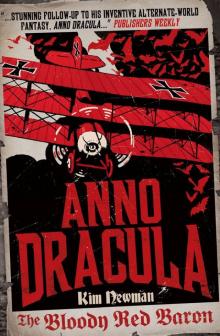 The Bloody Red Baron
The Bloody Red Baron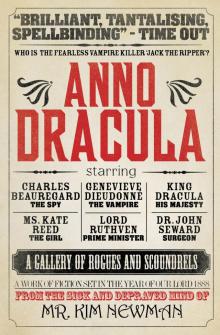 Anno Dracula
Anno Dracula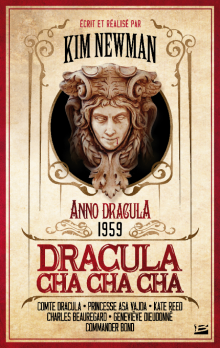 Dracula Cha Cha Cha
Dracula Cha Cha Cha Anno Dracula 1999
Anno Dracula 1999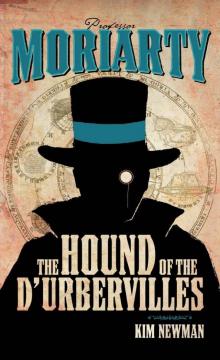 Moriarty: The Hound of the D'Urbervilles
Moriarty: The Hound of the D'Urbervilles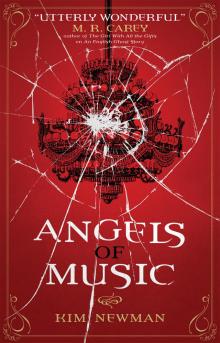 Angels of Music
Angels of Music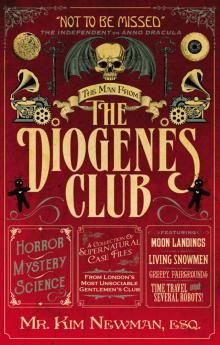 The Man From the Diogenes Club
The Man From the Diogenes Club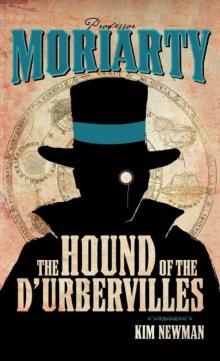 Professor Moriarty: The Hound Of The D’urbervilles
Professor Moriarty: The Hound Of The D’urbervilles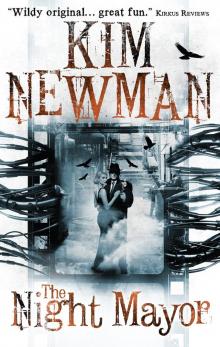 The Night Mayor
The Night Mayor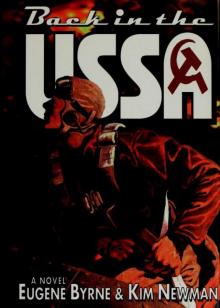 Back in the USSA
Back in the USSA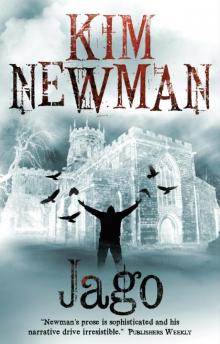 Jago
Jago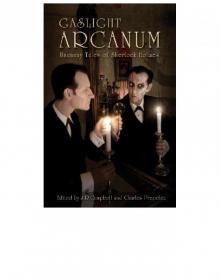 Gaslight Arcanum: Uncanny Tales of Sherlock Holmes
Gaslight Arcanum: Uncanny Tales of Sherlock Holmes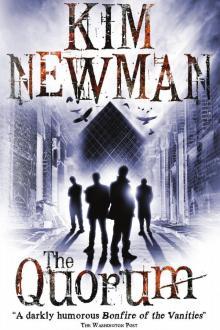 The Quorum
The Quorum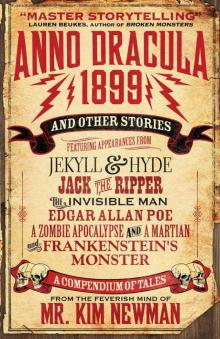 Anno Dracula 1899 and Other Stories
Anno Dracula 1899 and Other Stories Life's Lottery
Life's Lottery The Secrets of Drearcliff Grange School
The Secrets of Drearcliff Grange School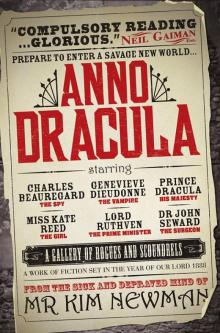 Anno Dracula ad-1
Anno Dracula ad-1 The Bloody Red Baron: 1918 ad-2
The Bloody Red Baron: 1918 ad-2 An English Ghost Story
An English Ghost Story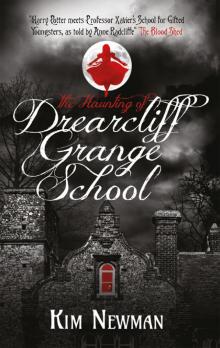 The Haunting of Drearcliff Grange School
The Haunting of Drearcliff Grange School The Other Side of Midnight
The Other Side of Midnight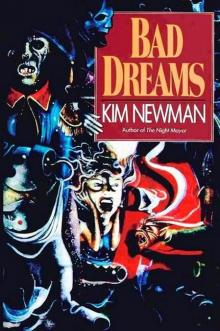 Bad Dreams
Bad Dreams Anno Dracula--One Thousand Monsters
Anno Dracula--One Thousand Monsters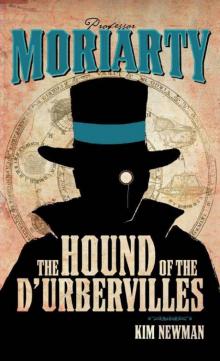 The Hound Of The D’urbervilles
The Hound Of The D’urbervilles The Bloody Red Baron: Anno Dracula 1918
The Bloody Red Baron: Anno Dracula 1918